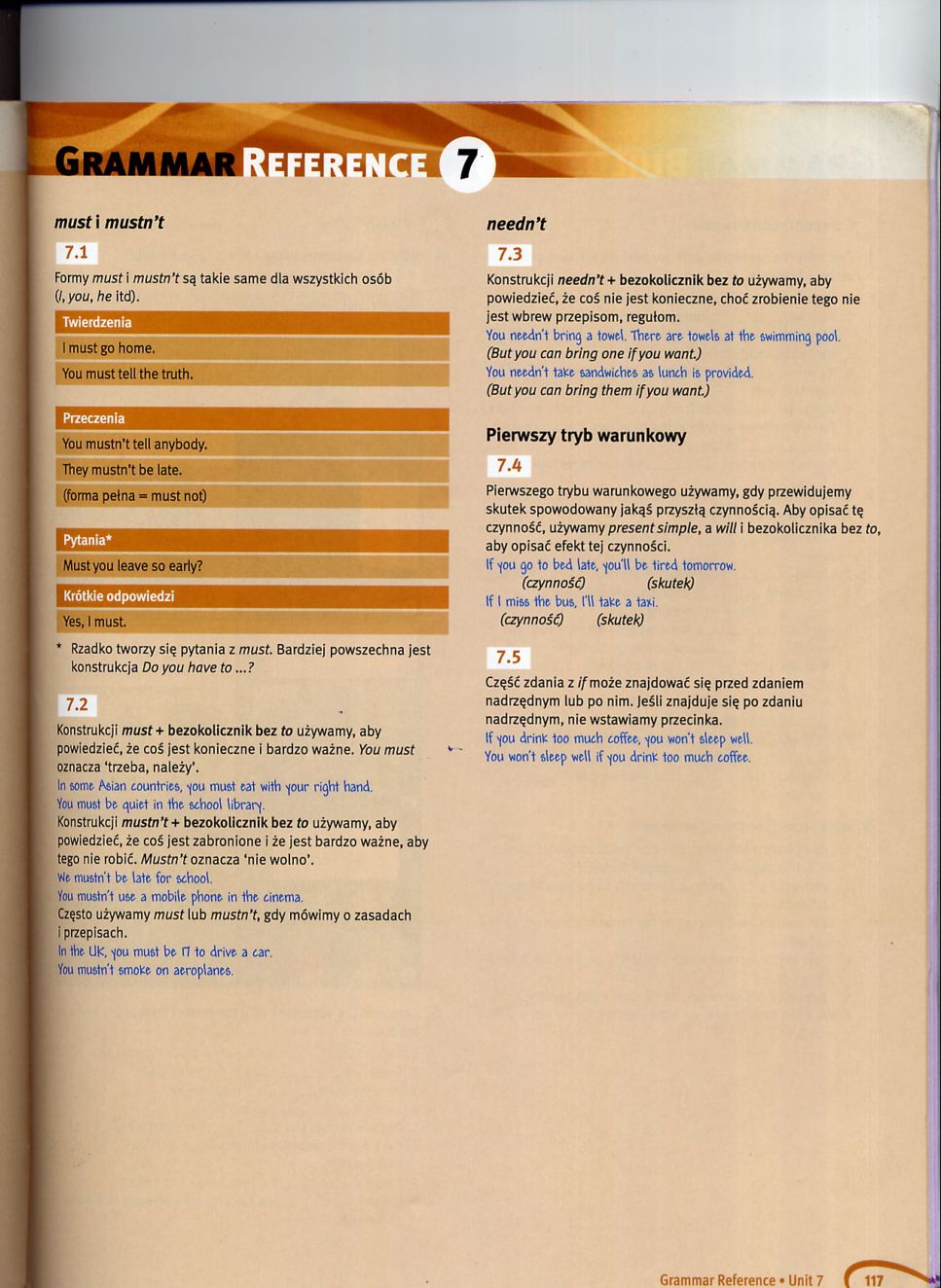ZDIĘCIA0112

must i mustn’t
7.1
Formy must i mustn't są takie same dla wszystkich osób (/, you, he itd).
Twierdzenia
I must go home.
You must tell the truth.
Przeczenia
You mustn't tell anybody. They mustn't be late. (forma pełna = must not)
Pytania*
Must you leave so earty?
Krótkie odpowiedzi
Yes, I must.
* Rzadko tworzy się pytania z must. Bardziej powszechna jest konstrukcja Do you have to...?
7.2
Konstrukcji must+ bezokolicznik bez to używamy, aby powiedzieć, że coś jest konieczne i bardzo ważne. You must oznacza ‘trzeba, należy'.
In some Mian countries, fou must eat with -|our right hand.
You must bo guiet in the school libranj.
Konstrukcji mustn’t+ bezokolicznik bez to używamy, aby powiedzieć, że coś jest zabronione i że jest bardzo ważne, aby tego nie robić. Mustn't oznacza 'nie wolno'.
Vls mustnt be late for school.
You mustnt use a mobile pbone in the cinema.
Często używamy must lub mustn't, gdy mówimy o zasadach i przepisach.
In the Ule. fou must be fi to drive a car.
You mustnt smoke on aeroplanes.
needn’t
7.3
Konstrukcji needn't+ bezokolicznik bez to używamy, aby powiedzieć, że coś nie jest konieczne, choć zrobienie tego nie jest wbrew przepisom, regułom.
You neednt bring a towel. There are towels at the swimming pool.
(But you can bring one ifyou want.)
You neednt take sandwiches as lunch is provided.
(But you can bring them ifyou want.)
Pierwszy tryb warunkowy
7.4
Pierwszego trybu warunkowego używamy, gdy przewidujemy skutek spowodowany jakąś przyszłą czynnością. Aby opisać tę czynność, używamy presentsimple, a will i bezokolicznika bez to, aby opisać efekt tej czynności.
If fou go to bed late, iou'11 be tired tomorrow.
(czynność) (skutek)
If I miss the bus, TH lakę a taki.
(czynność) (skutek)
7.5
Część zdania z if może znajdować się przed zdaniem nadrzędnym lub po nim. Jeśli znajduje się po zdaniu nadrzędnym, nie wstawiamy przecinka.
If -|ou drink too much coffee. f>u wont sleep well.
You wont sleep well if fou drink too much coffee.
Grammar Reference • Unit 7
Wyszukiwarka
Podobne podstrony:
ZDIĘCIA0102 Past simple2.1 Formy czasownika w zdaniu twierdzącym są takie same dla wszystkich osób (
Postulaty Einsteina Zasada względności Einsteina Wszystkie prawa przyrody są takie same we wszystkic
z czynników. Czyli jeżeli wydajność pracy ludzkiej i wydajność kapitału są takie same dla dwóch
skanuj0010 (295) Typy zadań na poziomie rozszerzonym są takie same jak na poziomie podstawowym. Nagr
Image8581 Odbiorca sygnatura są takie same, to podpis jest zweryfikowany
skrypt wzory i prawa z objasnieniami50 ■ W naszym przypadku częstości drgań wzajemnie prostopadłych
scan0020 (30) 278 Polityka między narodami kwestię, powody porażki są takie same jak w przypadku por
IMG Sowy Przyjrzyj się sowom: czy na pewno są takie same? Znajdź sześć szczegółów, którymi się różn
JUŻ WIEM POTRAFIĘ W PRZEDSZKOLU (13) Ile rybek pływa w akwarium? Wpisz cyfrę w kratki. Czy wszystki
karta pracy (58) Dorysuj usta na dwóch ostatnich rysunkach. Sprawdź, czy w walizce są takie same rze
więcej podobnych podstron